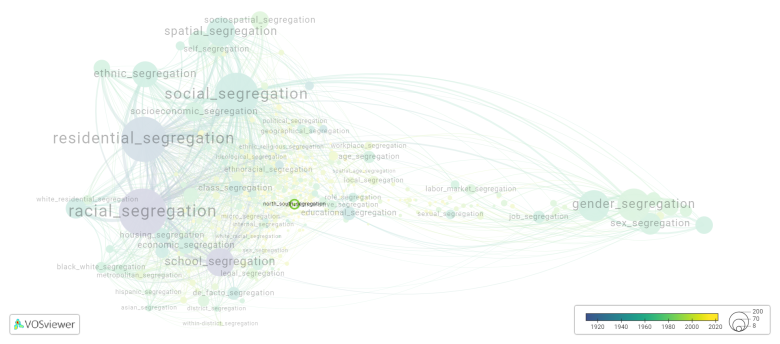North south segregation: Difference between revisions
(Creating page) |
(Creating page) |
||
| Line 13: | Line 13: | ||
North south segregation is frequently discussed in the literature with the following segregation forms: | North south segregation is frequently discussed in the literature with the following segregation forms: | ||
[[ | [[racial segregation]] | ||
[[File:north_south_segregation.png|780x780px]] | [[File:north_south_segregation.png|780x780px]] | ||
| Line 19: | Line 19: | ||
For the complete network of associated segregation forms, see: | For the complete network of associated segregation forms, see: | ||
year of publication https://tinyurl.com/2235lkhw | |||
Louvain clusters https://tinyurl.com/2d8wg5n3 | |||
betweenness centrality https://tinyurl.com/223udk5r | |||
disciplines where segregation forms first appeared https://tinyurl.com/244d8unz | |||
==References== | ==References== | ||
==Notes== | ==Notes== | ||
Revision as of 14:37, 27 September 2024
Date and country of first publication[1]
1998
United States
Definition
North-South segregation refers to the division and separation of communities or populations based on cultural, economic, racial, or social differences between the northern and southern regions of a country. This type of segregation can manifest in various ways, such as disparities in income levels, access to resources and opportunities, quality of education, healthcare services, and overall living conditions.
In the United States, for example, historical patterns of segregation have often seen African Americans concentrated in the southern states, while the northern states have a higher concentration of white populations. This division has been perpetuated by discriminatory housing policies, economic disparities, and social inequality.
Efforts to combat and address North-South segregation may involve policies and programs that promote economic development, improve access to quality education and healthcare, and address systemic inequalities that have contributed to the divide. Additionally, fostering dialogue, understanding, and collaboration between communities in the North and South can help bridge the gap and promote unity and inclusivity.
See also
Related segregation forms
North south segregation is frequently discussed in the literature with the following segregation forms:
For the complete network of associated segregation forms, see:
year of publication https://tinyurl.com/2235lkhw
Louvain clusters https://tinyurl.com/2d8wg5n3
betweenness centrality https://tinyurl.com/223udk5r
disciplines where segregation forms first appeared https://tinyurl.com/244d8unz
References
Notes
- ↑ Date and country of first publication as informed by the Scopus database (December 2023).
At its current state, this definition has been generated by a Large Language Model (LLM) so far without review by an independent researcher or a member of the curating team of segregation experts that keep the Segregation Wiki online. While we strive for accuracy, we cannot guarantee its reliability, completeness and timeliness. Please use this content with caution and verify information as needed. Also, feel free to improve on the definition as you see fit, including the use of references and other informational resources. We value your input in enhancing the quality and accuracy of the definitions of segregation forms collectively offered in the Segregation Wiki ©.
North south segregation appears in the following literature
Goldberg D.T. (1998). The new segregation. Race and Society, 1(1), 15-32. Elsevier BV.https://doi.org/10.1016/S1090-9524(99)80184-3

